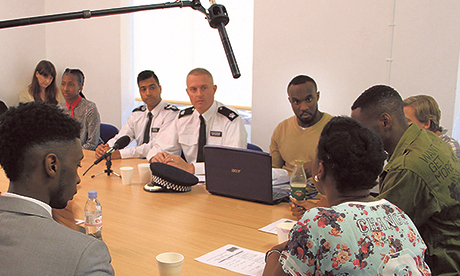Stop and search doubles to tackle ‘escalating gang violence’

Deji Adeoshun (right, with laptop) helps run the youth stop and search monitoring group
The use of controversial stop and searches has rocketed across the borough in response to what the police have called “escalating gang violence”.
Officers used stop and search 522 times in October 2015, but in the same month the year before they used it just 228 times, according to the latest police figures.
“There has been a general increase in stop and search to combat some of the violent and gang-related crimes that have occurred in Hackney in the last 12 months,” said Chief Superintendent Simon Laurence of Hackney Police.
Although knife crime in Hackney has fallen, the capital as a whole has seen a 6.9 per cent rise in the last year.
Chief Supt. Laurence said police had made a concerted effort to tackle “escalating gang violence” in Hackney as well as a “disturbing increase in knife crime” across London.
“This includes the use of targeted stop and search, where it is an appropriate tactic, in areas with high levels of knife crime and gang violence.”
Other tactics the police use to tackle knife crime include patrols, weapons sweeps on estates, visiting gang members and working with shops that sell knives.
Monitoring
Black people are still more than twice as likely than white people to be stopped and searched.
Young people aged between 15 – 24 continue to be stopped the most, and police stopped almost three times the amount in this age group in October 2015 (304) compared to October the previous year (107).
Deji Adeoshun of the Young People’s Stop and Search Monitoring Group urged the police to involve young black men in particular in their efforts to reduce knife crime.
“The Met needs to think hard about how to engage a community that feels victimised by them for so many years,” he said.
“It’s important that new officers continue to be trained in how best to engage young people around stop and search and that young black men are part of the solutions going forward.”
Asian people are twice as likely than white people to be stopped and searched.
Ruling
Last month the UK Supreme Court ruled that the use of random stop-and-search powers to tackle gun and knife crime and gang violence is lawful.
The court said there was a risk that they could be used in a discriminatory way but that there were adequate safeguards in place.
The deputy president of the Supreme Court, Lady Hale, said there were “great benefits to the public in such a power”, particularly to the black community.
In a Guardian article Lady Hale said: “Put bluntly, it is mostly young black lives that will be saved if there is less gang violence in London and some other cities.
“It is the randomness and therefore the unpredictability of the search which has the deterrent effect and also increases the chances that weapons will be detected.”
The five judges unanimously ruled that section 60 of the 1994 Criminal Justice and Public Order Act, which allows random stop and searches, is lawful and compatible with the European convention on human rights.
